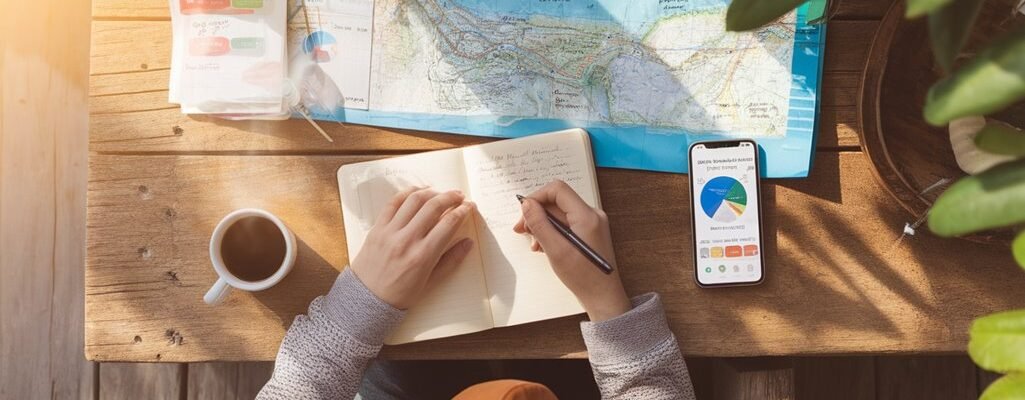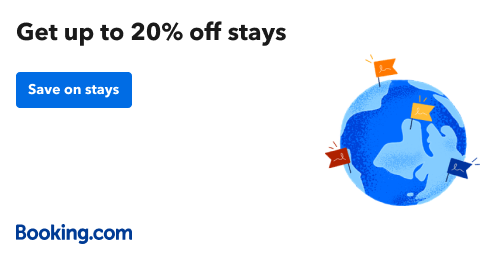
How to Budget for a Solo Adventure Without Stress
To budget for a solo adventure without stress, start by assessing your income and expenses to set a realistic budget. Research your destination's costs, focusing on transportation, accommodation, and activities. Identify your must-do experiences and allocate your funds accordingly. Look for deals, discounts, and consider alternative accommodations like hostels. Create a daily spending plan to keep track of expenses. Build a buffer for unexpected costs and remain flexible to adapt your plans if needed. This approach ensures you're prepared and can enjoy your adventure without financial worries, while there's more valuable insight waiting for you.
Assess Your Financial Situation
Before you dive into planning your solo adventure, it's essential to take a close look at your financial situation. Start by conducting a thorough income assessment. List all your streams of income and evaluate how much you can consistently set aside for your trip. This will give you a clearer picture of your financial health.
Next, define your financial goals. Think about what you want to achieve with your adventure—whether it's exploring new cultures, hiking breathtaking trails, or simply enjoying time away from routine. Knowing your goals helps you prioritize and allocate funds effectively.
Additionally, review your current expenses. Identify areas where you can cut back to save more for your trip. You might find that reducing discretionary spending can significantly boost your travel fund.
While it's exciting to dream about your adventure, grounding your plans in a realistic financial assessment ensures you're prepared.
Set a Realistic Budget
When planning your solo adventure, setting a realistic budget is crucial to ensure you can enjoy your trip without financial stress. Start by determining how much you can comfortably spend based on your current savings and income.
Factor in all potential costs, including transportation, accommodation, food, activities, and souvenirs. It's essential to use savings strategies that work for you, like cutting back on non-essential expenses or picking up a side gig to boost your travel fund.
Next, build in a buffer for unexpected expenses. Things can go awry when you're on the road, and having extra funds set aside for emergencies will ease your mind. Aim to save at least 10-20% of your budget for these unforeseen costs.
Once you've outlined your budget, review it regularly and adjust as necessary. This flexibility allows you to embrace spontaneity without worrying about overspending.
Research Destination Costs
Understanding the costs associated with your chosen destination is key to effective budgeting for your solo adventure. Start with thorough destination research to uncover the expenses you may encounter. Look into accommodation, food, transportation, and activities. Each place has its own price range, and knowing these can help you plan your finances better.
Once you've gathered information, conduct a cost comparison between similar destinations. This will give you insight into which locations offer the best value for your money. For instance, some cities may have a higher cost of living but offer free or low-cost attractions, while others might've affordable lodging and pricey entertainment options.
Don't forget to factor in additional costs, like visa fees or travel insurance, which can vary significantly depending on where you go.
Be sure to explore local forums, blogs, and travel guides to get a realistic view of what you'll spend day-to-day.
Prioritize Your Experiences
Many travelers find it essential to prioritize their experiences when budgeting for a solo adventure. With countless possibilities, focusing on what truly matters to you enhances your journey and helps you allocate funds wisely.
Begin by defining your adventure goals. Are you seeking adrenaline, relaxation, cultural immersion, or perhaps a mix? Knowing your priorities allows you to assess the experience value of each activity.
Next, make a list of must-do experiences that align with your goals. This could include hiking a specific trail, attending a local festival, or taking a cooking class.
Rank these experiences based on their importance and the value they bring to your adventure. This'll help you see where to splurge and where to save.
Look for Deals and Discounts
While you're planning your solo adventure, searching for deals and discounts can significantly stretch your budget. Start by exploring discount websites that aggregate travel promotions across various platforms. You'll often find seasonal offers that can save you a bundle on flights and accommodations.
Don't forget to look into package deals that combine flights, hotels, and activities at a lower rate than booking separately. This can be a game-changer for your travel plans.
Additionally, consider signing up for loyalty programs with budget airlines to earn points and access exclusive discounts.
If you're traveling during off-peak times, you might snag some incredible local discounts on attractions and meals, enhancing your experience without breaking the bank.
Also, keep an eye out for group rates, even if you're traveling solo. Some tour companies offer discounts for a minimum number of participants, so you could team up with fellow travelers to save money.
Create a Daily Spending Plan
After securing the best deals and discounts for your trip, it's time to create a daily spending plan to keep your finances in check. Start by reviewing your travel itinerary and identifying key activities or attractions each day. This helps you estimate your daily expenses based on what you want to do.
Next, allocate a specific budget for each day. Think about meals, transportation, entry fees, and any spontaneous activities. It's wise to include a little extra for unexpected costs—after all, adventures can be unpredictable!
You might want to break down your spending into categories: essentials, experiences, and leisure, ensuring you balance enjoyment with budget constraints.
Consider using an app or a simple spreadsheet to track your daily expenses. This way, you can adjust your spending in real-time, avoiding overspending and financial stress. If you notice you're going over budget on one day, you can cut back on another day to maintain your overall plan.
Consider Alternative Accommodations
Exploring alternative accommodations can significantly enhance your solo adventure while saving you money. Instead of sticking to traditional hotels, consider hostel options that provide a vibrant atmosphere and opportunities to meet fellow travelers.
If you're feeling adventurous, look into unique stays like treehouses or yurts, which can add a memorable twist to your trip.
Home exchanges are another fantastic way to save on lodging costs. You can swap homes with someone in your desired destination, allowing you to live like a local.
Similarly, house sitting can offer free accommodation while taking care of someone's home and pets, giving you an authentic experience.
Don't overlook camping sites, especially if you're seeking nature and solitude. Many national parks have affordable camping options that can immerse you in stunning landscapes.
For more flexibility, check out local rentals, which often come equipped with kitchens to help you save on meals.
Lastly, budget hotels and shared accommodations can provide comfort without breaking the bank.
Use Budgeting Apps
Budgeting apps can be your best friend when planning a solo adventure. They simplify tracking your expenses, helping you stay on top of your budget without feeling overwhelmed.
With various budgeting features available, you can categorize your spending, set limits, and monitor your progress in real-time. This way, you'll have a clear picture of where your money's going, allowing you to make informed decisions.
When choosing the right app, don't skip app comparisons. Look for options that suit your specific travel needs.
Some apps may excel in expense tracking, while others might offer helpful tools for planning itineraries or saving for future trips. Take advantage of free trials to explore the features and find the one that resonates with you.
Stay Flexible and Adaptable
A successful solo adventure often hinges on your ability to stay flexible and adaptable. When you venture out on your own, things mightn't always go as planned.
Unexpected expenses can pop up, whether it's a last-minute accommodation change or an unforeseen activity that catches your eye. Embracing flexibility allows you to pivot and make the most of these new opportunities without derailing your budget.
To prepare for the unexpected, consider investing in travel insurance. This safety net can cover costs associated with trip cancellations or emergencies, giving you peace of mind while you explore.
With travel insurance in place, you'll feel more empowered to take risks and enjoy spontaneous adventures.
Frequently Asked Questions
How Can I Save Money While Traveling Solo?
To save money while traveling solo, embrace smart solo travel tips like using public transport, cooking your meals, and staying in hostels. These money-saving strategies let you explore freely without breaking the bank.
What Are the Best Budgeting Apps for Solo Travelers?
For solo travelers, apps like Mint or Travel Mapper excel at expense tracking and let you create travel categories. They help you monitor spending, ensuring you enjoy your adventure without financial worries holding you back.
Should I Travel During the Off-Peak Season?
Traveling during the off-peak season offers significant benefits, like avoiding crowds and enjoying a more relaxed atmosphere. Plus, you'll snag seasonal discounts, making your adventure more affordable while embracing that sense of freedom you crave.
How Do I Handle Unexpected Expenses on My Trip?
When unexpected expenses arise, tap into your emergency fund and adjust your flexible itinerary. Keep your plans adaptable, so you can easily shift activities or accommodations without compromising your adventure's spirit and enjoyment.
What Travel Insurance Options Should I Consider for Solo Adventures?
When choosing travel insurance for your solo adventure, consider coverage types like medical, trip cancellation, and theft. Make policy comparisons to ensure you find the best fit for your needs and enjoy your freedom worry-free.
Conclusion
By taking the time to assess your finances and set a realistic budget, you can enjoy your solo adventure without the stress. Researching costs and prioritizing experiences will help you make informed choices. Don't forget to look for deals and create a daily spending plan. Consider alternative accommodations and leverage budgeting apps to keep track of expenses. Remember, staying flexible and adaptable can lead to unexpected joys and savings along the way. Happy travels!




